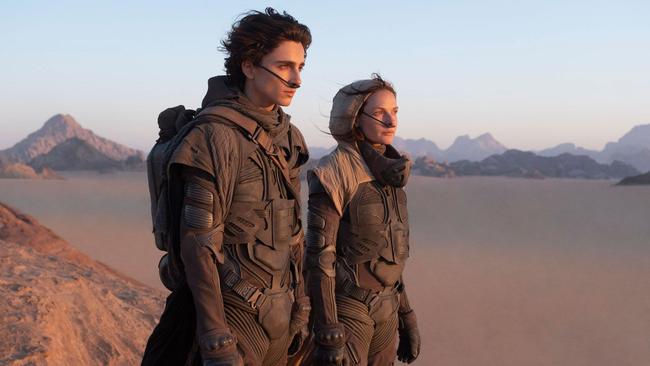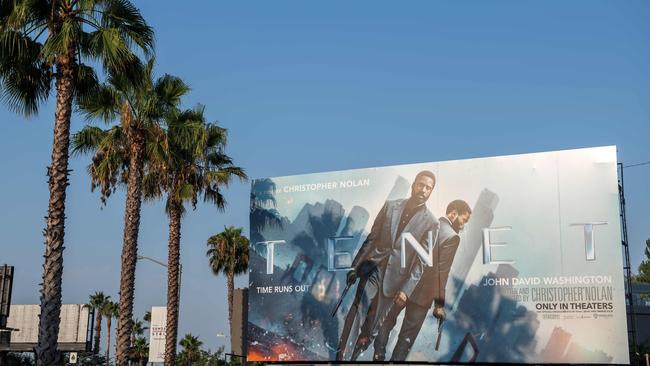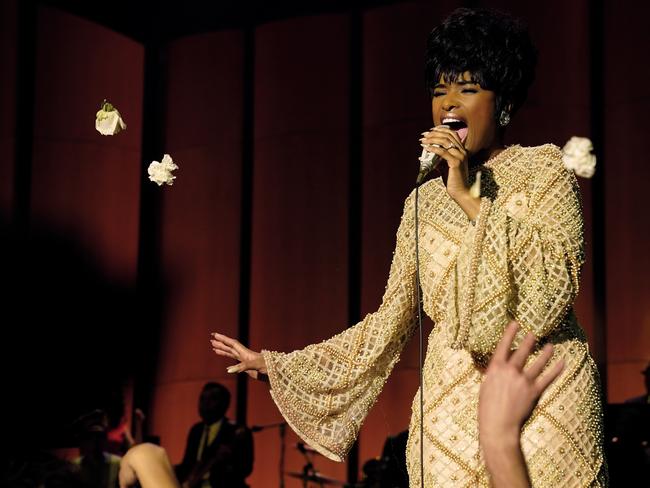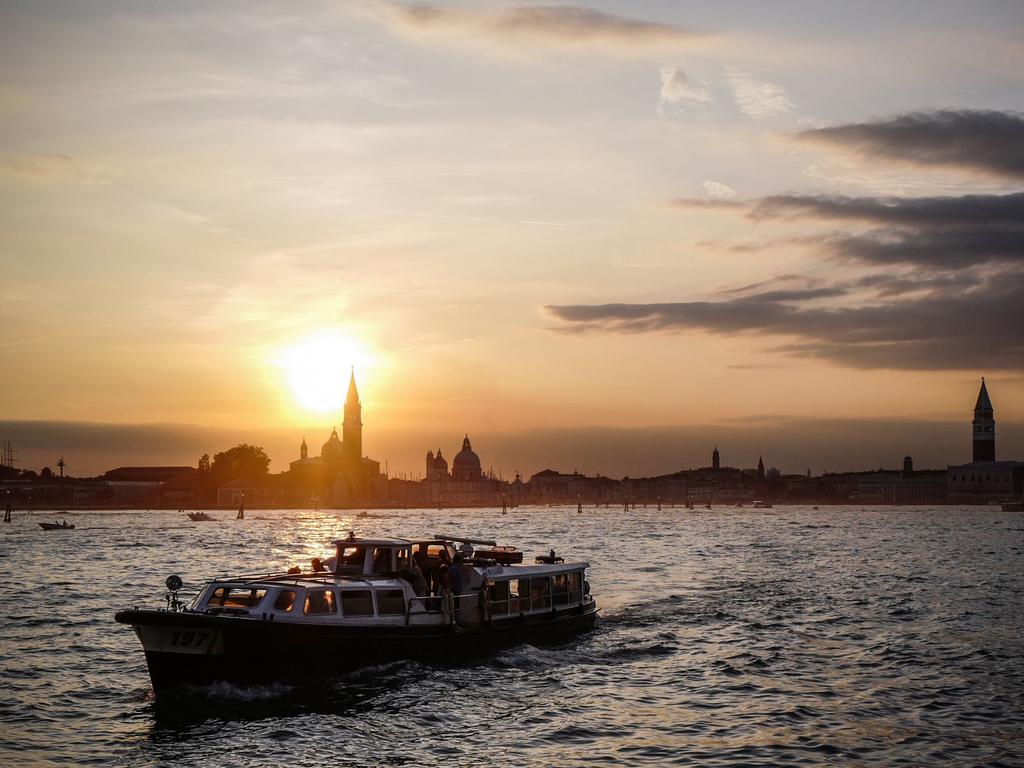Dune, Bond, Respect: movies coming soon and in 2021
A slate of big budget movies are ready to hit a theatre near you.

It was always going to be a job for a blockbuster — even one with a mixed bag of reviews. For the past couple of months, and despite a few delays, Christopher Nolan’s Tenet has been touted as the film that will save cinema. Now, in the week of its release, the results are in and, while it’s still best to be cautious, the solid performance at the box office means the industry has some cause for optimism.
In Australia, where social distancing is in place and Victoria’s cinemas are closed, Tenet did $2.5m at the box office in its opening weekend (this does not include the box office for the preview weekend, seven days earlier).
Worldwide, according to Variety, it took $US53m ($72m) in 41 territories, excluding the US and China, where it will open this week. The receipts suggest audiences are ready to come back to movie theatres — for a highly publicised big budget action film, at any rate. For Damian Keogh, president and CEO of the Hoyts Group, the local box office is a good sign.
“Given all the limitations we’re facing — and the fact that Victoria, a significant part of the national box office, isn’t in it — we are really enthused by the results,” he says. “There’s more positive momentum starting to build up … Something like over 70 per cent of the world’s cinemas are now open and over 50 per cent of the cinemas in the US are open.”

Meanwhile, independent road rage thriller Unhinged, which stars Russell Crowe, took the top spot at the American box office, with $US4.2m in the US and Canada. The Wall St Journal described Unhinged as “Hollywood’s first true test case of a wide release since the pandemic shut theatres in the US in March”. So far, the action movie has grossed $US8.8m domestically/in the US. In Australia, where it was released on July 30, it has taken $3.1m.
And in China, cinema attendance is in another league again. Sino-Japanese War drama The Eight Hundred grossed about $US70m this weekend, according to media measurement company comScore Inc. The blockbuster has made more than $US270m since its August 14 release.
But, despite these encouraging signs around the globe, it also makes sense to be cautious.
For Keogh, the pandemic has meant that “the toll on our industry has been massive … Without JobKeeper, we probably wouldn’t even be able to open our doors”.
Benjamin Zeccola, CEO of arthouse chain Palace Cinemas, doesn’t pull any punches either. “Right now our heads are down and we’re in survival mode,” he says, but he’s also determined. “We’ve been around for 50 years. We hope to be around for another 50 years.”
In 2020, the movie industry, like so many other businesses and creative enterprises, has been deeply affected by the impact of coronavirus. Cinemas have shuttered, productions shut down, events and festivals postponed. There has also been a widespread assumption that streaming services have been the beneficiaries.
As cinemas have begun to reopen, in various ways and with varying degrees of regulation, audiences are starting to return. But if this is to mean anything, the virus needs to be contained, and potential filmgoers need to feel confidence in the safety measures in place.
And the cinemas need new movies.
In the midst of the pandemic there is a broader debate taking place about the future of moviegoing and moviemaking, a discussion that has already been happening in Australia and beyond. There are challenges in every part of the screen industry, from broadcast TV to independent movies to streaming services to blockbusters.

Graeme Mason, CEO of federal agency Screen Australia, says: “One of the things I really am encouraging people to understand is that there were huge shifts going on anyway in our sector in production and distribution terms. COVID has just exacerbated and accelerated them.”
One of the first responses to COVID-19, and the contraction of movie theatre audiences, was to delay the release of big-budget titles. The new Bond film, No Time To Die, was the first blockbuster to shift, with an announcement in March that it was going from April to November.
“The studio relationship has been tested through this,” says Keogh. “Naturally, they’re investing significant money in making movies. And if the box office isn’t there for them, they’ve either held them back, which has been the majority of the cases, or they have moved to streaming services.”
For the time being, this is happening without Victoria, which represents about a quarter of the Australian box office. Its cinemas are closed until September 13 at the earliest. Zeccola argues that filmgoing should not be overlooked when stage-four restrictions are lifted in the state. “Cinemas need to open in Victoria as soon as it’s safe for the economy to open. When hospitality can open, when retail is allowed to open, cinema should be allowed to open,” he says.
The movie theatre’s demise has been predicted before. New technologies have been regarded as a significant threat: the arrival of television, the advent of VHS and home entertainment and, most recently, the rise of streaming services. In the wake of COVID-19, streaming services have undoubtedly flourished. Some of the films that were destined for cinemas have ended up on streaming platforms, and not only smaller titles that will not have the benefit of publicity or advertising to help them find an audience.

The biggest example has been Disney’s Mulan, the live-action remake of the 1998 animation, which was shifted to its Disney+ streaming service and will now be available, for an additional fee, on September 4. There was plenty of anxiety about the Mulan decision, and its implications for other high-profile titles. In the meantime, the holdback of blockbusters has had some benefits for smaller releases, suggests Madman Entertainment’s co-founder, Paul Wiegard. “With Hollywood films being pushed back into 2021 there’s more theatrical space for an independent distributor. Films like Made In Italy (a comedy-drama with Liam Neeson) are being released more widely than initially planned.”
The holdover has been accompanied by a temporary halt to productions, now gradually being resumed. This might balance out, suggests Keogh, if there are no setbacks. “If the industry can open back up again now … But if production is halted and everything moves back nine or 12 months, then I think there is probably a little hole down the line. I mean, we’re not at this stage overly bullish on 2021, even though the line-up at this stage looks very positive.”
Looking to the future, there’s a debate about the kinds of films that will bring audiences into the cinema. Uncertainty relates to blockbusters and independent films alike. And there are still those who urge a rethink about the centrality of the theatrical experience. The length of the window between theatrical and streaming release will become the subject of discussion; so will the way to protect and nurture the local industry, particularly when it comes to streaming platforms.
For Mason, who is “a firm believer that cinema will always be with us”, it’s important to find the right platform for each project. “What we are here to do is to ensure that a range of Australian stories gets made by a range of Australian creatives for a range of audiences.” Which platform they will be seen on, and how to bring audiences to them, is another matter. So post-COVID, what will change about the films that are seen in cinemas? Wiegard talks about seeking out “remarkable” films to represent, films that “inspire conversation”.
Mike Baard, managing director of Universal Pictures International Australia, suggests that studios “have been thinking long and hard about which movies will be drawcards to leave their homes and visit cinemas” and he believes that “we have a very strong model and once we are through this pandemic we will see audience numbers return and perhaps even seen exceed past historical highs”.

During the pandemic there have been other adjustments to the movie ecosystem: the cancellation of festivals such as Cannes; or the shift to online versions, a decision taken by Sydney and Melbourne. The Golden Globes are now scheduled for February 2021. The Oscars have been put back to April. The festival circuit is back on track at this stage, albeit in a reduced physical and digital fashion, with Venice going ahead on September 3, Toronto on September 10 and Vienna on October 3.
What cinemas will have going for them, all agree, is the shared experience. Katrina Sedgwick, director and CEO of the Australian Centre for the Moving Image — which was closed for major renovations when COVID-19 struck, and has had its reopening pushed back — is very clear about what it offers. “There is something so magical about going to the cinema — gathering together in the dark, sharing the wonder of the moving images on the screen and the sound that envelops you. Even the ritual of choc tops and popcorn. Humans are such social animals – being together to share an experience is almost a primal need.” It’s an experience that some argue will mean even more to people coming out of long periods of isolation — if they are confident that health and safety protocols are in place.

There is also a perceived significance to movies that play in cinemas, according to Mason, even if movies on streaming services play to a large global audience. “I think this is why film will always continue,” he says. “There’s this noise around film that you don’t get around anything else. I don’t just mean Marvel and spending hundreds of millions of dollars on prints and advertising. I do think films going to the big festivals or being talked about get a buzz and awareness much greater than their box office and ticket sales numbers equate to.”
So what movies will we be talking about for the rest of the year, if the return to cinemas takes place as anticipated? Among the bigger titles that have been scheduled: Wonder Woman 1984 has an October release date, as does the much-anticipated horror movie remake Candyman. Black Widow, which marks the Marvel debut for Australian director Cate Shortland, is now scheduled for October. October also brings a new Miranda July movie,
Kajillionaire; a Czech drama, Corpus Christi, about a young criminal who’s had a spiritual epiphany; and Never Rarely Sometimes Always, Eliza Hittman’s beautifully observed story of a teenage girl seeking an abortion in New York.
Boxing Day, traditionally a big day on the Australian cinema calendar, already has several films scheduled, including Denis Villeneuve’s take on science-fiction epic Dune, starring Timothee Chalamet, and a new Pixar animation, Soul.
The new year will bring Jennifer Hudson in the Aretha Franklin biopic, Respect, in January; Kate Winslet and Saoirse Ronan star as lovers in period drama Ammonite, set for February 2021; and The Many Saints of Newark, a Sopranos movie prequel, comes in March.
Among Australian titles in early 2021: Glendyn Ivin’s Penguin Bloom, starring Naomi Watts, is a New Year’s Day release; Firestarter, Wayne Blair’s portrait of Bangarra Dance Theatre, is slated for March; and Robert Connolly’s adaptation of Jane Harper’s crime novel, The Dry, starring Eric Bana, is lined up for April.
For Eddie Tamir, co-owner of Melbourne’s Cameo, Lido and Classic and Sydney’s Randwick Ritz, the future holds “a wide range of films, big and small”. Audience demand is still there and filmmakers want their films on cinema screens, he says. Tamir has some strong words for pessimists he calls the “schadenfreudians”, circling the cinema industry looking for drama and carcasses. “Sorry to disappoint them,” he says, “but it seems that for the foreseeable future the main drama will continue to be on the silver screen.”
COMING ATTRACTIONS
- OCTOBER
Wonder Woman 1984
Candyman - horror remake
Black Widow - the Marvel debut for Australian director Cate Shortland
Kajillionaire - a new Miranda July movie
Never Rarely Sometimes Always - from writer and director Eliza Hittman
Corpus Christ - Czech drama about a young criminal who’s had a spiritual epiphany
- BOXING DAY
Dune - remake of the sci fi epic starring Timothee Chalamet
Soul - new Pixar animation
- 2021
Respect - Jennifer Hudson in the Aretha Franklin biopic
Ammonite - Kate Winslet and Saoirse Ronan star as lovers
The Many Saints of Newark - Sopranos movie prequel
- Aussie flicks
Penguin Bloom - starring Naomi Watts (January 1, 2021)
Firestarter - Wayne Blair’s portrait of Bangarra Dance Theatre (March 2021)
The Dry - starring Eric Bana (April 2021)





To join the conversation, please log in. Don't have an account? Register
Join the conversation, you are commenting as Logout